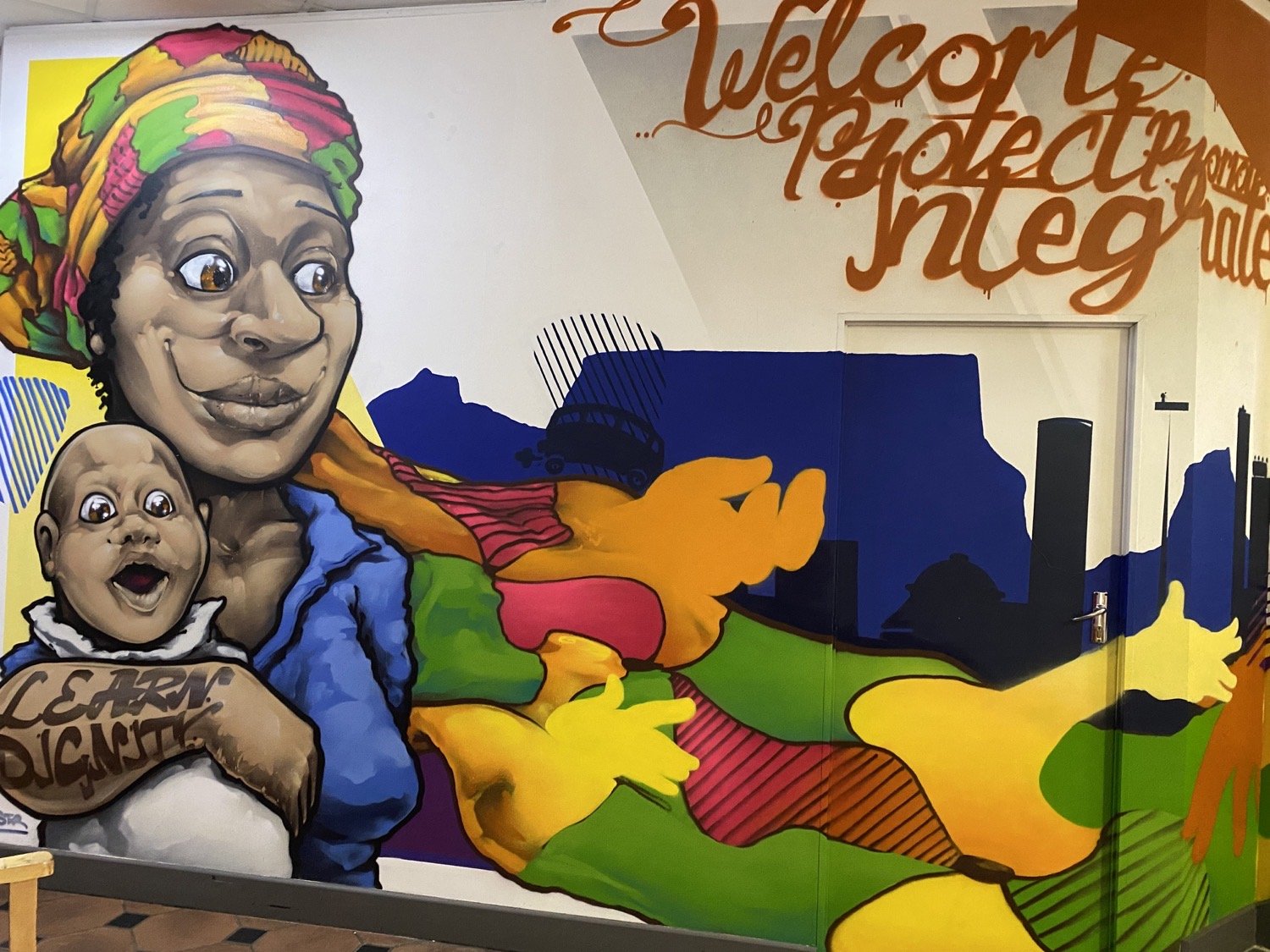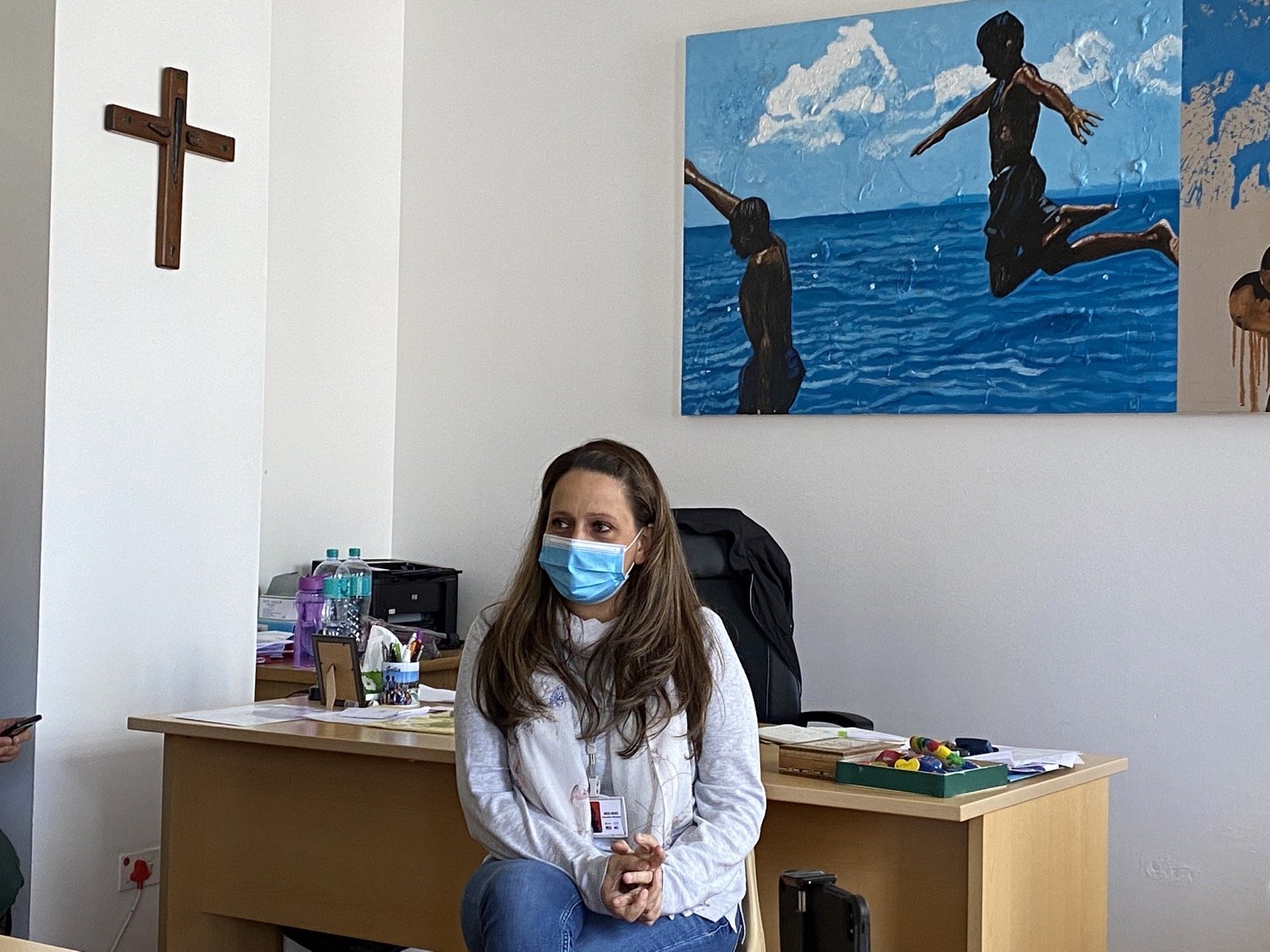South Africa’s Faith Groups Counter Rising Xenophobic Attacks On Migrants
After more than two years of COVID-19 lockdowns, in-person services are finally back at the Scalabrini Centre of Cape Town, South Africa. The nonprofit organization founded on Roman Catholic principles provides practical aid, spiritual counseling, and advocacy support to refugees, asylum-seekers, and migrants in South Africa.
The group’s mission is to see a “vibrant, working, welcoming, inclusive society” that embraces people who have come to South Africa from other nations. But Scalabrini leaders say rising anti-foreign sentiments across the country are posing severe challenges to that vision.
A brightly colored mural at the entrance of the Scalabrini Centre in Cape Town, South Africa, illustrates the group’s mission to “welcome, protect and integrate” refugees and asylum-seekers.
Giulia Treves, executive director of the Scalabrini Centre in Cape Town, South Africa, called xenophobia “an unresolved South African problem.”
“Xenophobia is an unresolved South African problem,” said Giulia Treves, executive director of the Scalabrini Centre. “From a migrant and refugee perspective … everyone is expecting things to get worse and worse.”
Amid skyrocketing unemployment and a widening gap between the rich and the poor, several new political movements are using overtly xenophobic rhetoric to blame foreigners for South Africa’s burgeoning social problems. In recent weeks, news reports highlighted several high-profile attacks against foreigners and migrant-owned small businesses.
Faith-based community organizations are among those leading the charge to prevent more xenophobic violence.
“Refugees in this country are in a very, very precarious place,” said the Rev. Paul Verryn, former secretary of the Church Unity Commission, a coalition of Protestant denominations. “Churches and other religious bodies have a responsibility to translate their faith into action.”
South Africa hosts the largest number of immigrants on the African continent. According to official estimates, immigrants make up at least 5% of the country’s population of 60 million, and migration experts believe the actual number is much higher. Most of the immigrants are people fleeing poverty, war, and government persecution in other African nations. With unemployment rates at nearly 40% overall and 65% among youth, a growing number of South Africans are accusing immigrants of taking their jobs, housing and social services.
Cape Town, South Africa. Photo by Kim Lawton.
An art exhibit in Johannesburg’s Constitution Hill urges South Africans to “be kind” to others.
“When things crash, people look for scapegoats,” said the Rev. Alan Storey, pastor of Central Methodist Church in Cape Town.
The most prominent anti-immigrant group is Operation Dudula, a grassroots organization formed in 2021. Its main aim is to fight against crime and the social burdens caused by “an influx of illegal immigrants.” “Dudula” means “to force out” in the Zulu language. Operation Dudula rallies often feature anti-immigrant slogans and banners that proclaim “South Africa First.”
The group denies xenophobic motives and says it only targets drug dealers, thieves, and illegal businesses. But several Dudula members have been accused of carrying out violent vigilante raids. In April, a Zimbabwean man was stoned and burned to death after a mob of anti-immigrant protesters went door-to-door in a community outside Johannesburg demanding to see passports.
Xenophobic violence is not new in South Africa. In 2008, nearly 60 people were killed and some 50,000 displaced during anti-immigrant riots. Other deadly flare-ups occurred in 2015 and 2019. Many community leaders say the current situation is troubling because the anti-foreigner groups are more organized and politically influential.
“Political parties are seeing anti-immigrant sentiment as a means to succeed,” said Scalibrini’s Treves. “It attracts votes.”
The Scalibrini Centre is one of several groups speaking out against newly proposed legislation that would limit the number of foreigners businesses can hire. Treves explained that this creates new barriers for immigrants trying to find employment while also establishing obstacles for those seeking asylum.
“We are very worried,” she said. In the wake of COVID-19 lockdowns, “there is a heightened state of anxiety” that is being taken out against refugees and asylum-seekers.
Some religious leaders say the growing anti-foreign sentiments are a legacy of South Africa’s apartheid past. “We still carry some of the scars of devaluing people,” said Verryn.
“This is a society that at its very core is still very much exclusionary, still very much reflects the realities of the past,” said Ntebaleng Morake, advocacy coordinator of the Social Justice Coalition. He accused groups such as Operation Dudula of using “apartheid tactics” against foreigners.
Amid the growing concerns, faith-based groups are part of several new projects to counter xenophobia. South Africa’s interfaith community has developed a national Hate Crimes Working group that is speaking out against violent attacks and providing practical help to victims. Jewish groups are helping to lead the effort.
Rabbi David Shaw of the Sandton Schul in Johannesburg says South Africa’s Jewish community knows “all too well the pain caused by xenophobia.”
“Thirty-six times in the Torah it says, ‘Heed the strangers — treat them with proper respect because you know what it’s like to be a stranger,’” said Rabbi David Shaw of the Sandton Schul in Johannesburg. “Our parents and our grandparents escaped from oppression. We know all too well the pain caused by xenophobia.”
The United Nations International Organization for Migration has launched a pilot program partnering with local faith leaders to promote “social cohesion” in areas that host migrants. The program is developing activities to foster mutual understanding, especially among young people, and to emphasize the positive contributions migrants can make to communities.
“The role of interfaith groups is very important to this,” said the organization’s chief of mission, Lily Sanya. “People still recognize that religion transmits values.”
Still, faith leaders acknowledge that anti-foreign sentiments have been adopted by some congregation members, especially those caught in the economic crisis and disillusioned by government corruption.
“They’re traumatized,” said Storey. “The traumatized turn on other vulnerable people and traumatize them.”
Many churches are struggling to meet the needs of their own congregations. Pastor Aaron Makili of the Great Commission Church in the Khayelitsha township outside Cape Town said the COVID-19 crisis has taken a devastating toll on his church and others that serve in low-income communities. Many congregants never returned when the lockdown was lifted, and offerings have dried up.
“Our churches are empty,” he said. “People have lost hope.”
Despite the complexities, many faith leaders say their communities have a moral obligation to fight xenophobia. “We want religious communities to face outward, not just inward,” said Renier Koegelenberg, executive secretary of the National Religious Association of Social Development.
“Change finally comes from courageous people doing the right thing,” added Storey. “It’s going to take all of us.”
Kim Lawton is president of Kim Lawton Media, a video production and media consulting company near Washington, D.C. She is the former managing editor of the highly-acclaimed PBS series "Religion & Ethics NewsWeekly."





